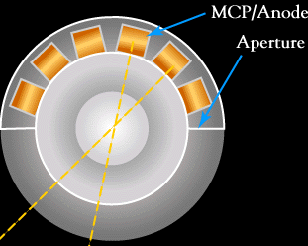Spacecraft & Instruments
The ELECTROSTATIC ANALYZER (ESA) measures the number of energetic electrons and ions present and how they are oriented in space as the spacecraft passes through the auroral zones. There are two types of ES analyzers: one which measures electrons, and one which measures ions (atoms missing at least one electron).
| Particle A: Too Fast (absorbed by walls) | |
| Particle B: Just Right (makes it to MCP) | |
| Particle C: Too Slow (absorbed by walls) | |
| Microchannel Plate - Amplifies energy of single particle into the charged pulse of a million electrons. | |
| Anode - Detects position of single particle that makes it through the detector. |
x-section of ESA as particles enter
Each hemispherically shaped ESA allows particles to enter over a180° field of view. The voltage between hemispheres determines what energy particles enter the detector. Sweeping this voltage from low to high values allows the detector to measure the number of particles at each energy. The 16 analyzers are grouped in pairs on opposite sides of the spacecraft. This provides an unobstructed 360° field of view around the spacecraft. The cross-section below shows the ESA resolving electrons according to direction.
